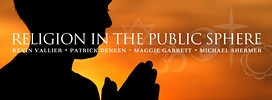I’d like to begin by thanking Patrick Deneen for his characteristically rich and forceful engagement with my essay. Give his strong disagreement with me, I think Deneen will be surprised that I agree with many of his claims about the nature of contemporary religious conservativism and the ultimate philosophical grounding of free institutions. But I expect him to be particularly surprised that I am sensitive to the worries he has about liberalism impinging on the ability of people of faith to live their religion fully, forcefully, and as an inherently worthwhile endeavor. Let me begin with the latter concern.
I. Integrity and Coercion
My position is that the proper role of religion in politics is primarily defensive and constructive, rather than offensive and coercive. To Deneen, this seems to imply that I view
… religion from the outside, [with] its final value… to be evaluated in secular terms. But for religious believers, its primary value is not the contribution it makes to political life, but in aiding people in their worship of God and the salvation of souls.
Deneen is making a version of the “integrity” objection to liberal theory, which holds that the constraints of liberal institutions require that religious citizens violate their integrity, as liberals require citizens of faith to forgo living out their faith in all aspects of their lives. One of the core arguments of my book is that in virtue of their own commitment to respecting integrity, political liberals must opt for a more open, convergence-based conception of their view. If liberalism requires integrity violations then, in my view, this is a severe defect in liberal theory.
So let me be clear: it is no part of my position that the primary value of religion is its contribution to politics. In fact, it is my recognition that religious citizens understand their faith as Deneen points out that has led me to endorse integrity objection and to use it to drive my criticism of mainstream political liberalism.
However, I do contend, I think in contrast to Deneen, that many religious believers, if not most, can accept a line of division between “defensive” and “offensive” uses of their faith. Of course religious believers of many stripes are committed to proselytization, but few are committed to coercing others in order for the coercers to live an authentically faithful life. Most conscientious objections come about from being coerced, not being required not to coerce.
So my classical liberal approach merely asks many citizens of faith (at least when in political office) not to coerce others when that coercion cannot be justified to them. Citizens of faith may dislike this restriction, but the restriction does not raise the integrity objection. The constraints of my conception of public reason may chafe, but not on integrity-based grounds.
I think there are probably two main exceptions to my claim that integrity is not violated by my classical liberal constraint on the use of force: (i) widespread conservative religious views on abortion, and (ii) some forms of political Islam.
In the former case, I don’t think religious citizens are under an obligation to forgo pushing for pro-life legislation because on their view, they’re protecting people from the worst forms of unjustified coercion, namely murder. So there is nothing in my view that prevents citizens from supporting the restriction of abortion. Officials are a more complicated case, which I can address if someone wants to press me on it.
Political Islam raises a powerful challenge, as it violates liberal restrictions in some attempts to institutionalize some aspects sharia law as applied to non-Muslims. I can imagine a certain sort of Muslim objecting on integrity-based grounds that they cannot institutionalize their preferred legal code. But here I believe I am right to insist that these demands are illiberal, especially those that purport to restrict freedom of religion. I acknowledge, then, that political Islam in some ways challenges my view.
But by and large, citizens of faith can live out their faith with fervor and sincerity even if they forgo the coercion that classical liberalism requires they forgo. Declining to coerce in the absence of a public justification is almost never incompatible with the central doctrines and practices of the world’s major religious traditions.
II. Religious Conservatism in Political Theory and Practice
On some of the sociological disputes: Deneen is right that many religious conservatives now hold what I describe as the “classical liberal” position, though I do not agree with him that the transition is largely complete. There are still plenty of conservative voters and politicians who believe in the establishment of civic theism (the only form of establishmentarianism that has political power in the United States). But it is true that in many areas religious conservatives are on the defensive. So long as they are, I believe they often take a genuinely liberal position. And for all I know, it may well turn out to be the case that religious conservatives in the 21st century are better friends of liberal institutions than secular progressives. I don’t know. In any case, I have no bone to pick with him here.
I also agree with Deneen that classical liberals often have a tin ear to conservative claims that free institutions require transcendent grounding in order to sustain them in the long run. I like to think I’m not one of those tin-eared liberals. In my view, free institutions will tend to be best sustained by those with transcendent understandings of the purpose of life, as these citizens will have the strongest reasons to oppose overreaching state power (if they can be persuaded to give it up themselves). And among these citizens are those, like Deneen, who believe in a God-given natural law. However, true stability will not be possible unless people with a wide variety of worldviews can identify with liberal institutions. Religious conservatives can form part of that consensus, but not the whole.

